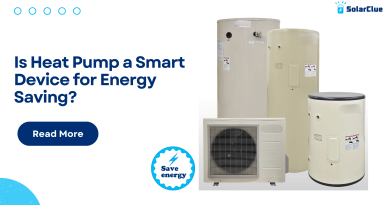Why Should We Save Energy?
India is now talking about adopting energy saving devices. But why should we save energy? There are many reasons to do that. The main reason is that it is a way for sustainable future. Not just that, it also helps in saving money.
In this blog, we’ll explore why conserving energy matters and how a heat pump can be an excellent solution for reducing your energy consumption at home.
Table of Contents
Why Do We Need to Save Energy?
There are several reasons to save energy. Some of them are listed below:
- Environment Friendly: Reducing energy consumption helps lower greenhouse gas emissions, which contribute to climate change and environmental degradation.
- Save Money: By using energy-efficient appliances and practices, you can significantly reduce your utility bills, saving you money in the long run.
- Reduce Pollution: The burning of fossil fuels for energy production leads to air and water pollution, which can have adverse effects on human health and ecosystems.
- Conserve Resources: Energy sources like coal, oil, and natural gas are finite resources. Saving energy helps conserve these resources for future generations.
- Increase Energy Independence: Reducing our reliance on imported energy sources can enhance a country’s energy security and independence.
How to Save Energy?
There are many ways to save energy. One way is in large scale by governments and industries. Like governments can come up with policies, that support saving energy. But as individuals, how to save energy at home?
You can do this by adopting energy-efficient appliances, which not only saves environment but also cost. One such appliance is a heat pump. It will fulfill your daily hot water needs while consuming 75% less electricity than a geyser.
Let’s understand more about heat pumps, and how it is the best energy saving device.
What is a Heat Pump?

A heat pump is a water heating device, to meet your daily hot water needs. It is energy-efficient, as it uses less electricity than other traditional water heaters. The difference lies in the working principle. Any traditional water heater, like a geyser, uses direct electricity to heat water. Whereas, a heat pump uses electricity to only transfer heat from one place to another. This heat is used to produce hot water, rather than electricity. A heat pump is one of the best sustainable ideas for the future.
How Does a Heat Pump Systems Work?
A heat pump works on the principle of transferring heat from one place to another.
This system consists of two main components: an indoor unit and an outdoor unit.
The outdoor unit has two parts – an exhaust fan and a compressor. And the indoor unit is the storage tank, where water is stored.
The exhaust fan absorbs heat from the surrounding air, while the compressor compresses the refrigerant gas, increasing its temperature. This heated refrigerant gas then passes through a spiral condenser inside the indoor unit, transferring its heat to the water stored in the tank. This process continues until the desired water temperature is reached.
Unlike traditional geysers that use a significant amount of electricity to generate heat, heat pumps consume less energy by simply moving heat from one place to another. This makes them more energy-efficient and cost-effective in the long run.
How Do Heat Pumps Contribute Towards Saving Energy?
Heat pumps are an excellent energy-saving device which you can install in your home to reduce your electricity bill. They absorb heat from the surrounding air, which is a renewable source. They are considered 90% renewable. This means that they have a minimal impact on the environment compared to conventional water heating methods that rely heavily on non-renewable energy sources. Instead of using direct electricity to heat water, this system uses electricity to only transfer the heat. This saves up to 75% electricity. So it not only saves electricity, but also cost. therefore heat pumps are affordable in the long run.
What Are the Other Benefits of Heat Pumps?
In addition to their energy-saving capabilities, heat pumps offer several other benefits:
1. Cost-Effective
Heat pumps have high upfront cost. However, they make up for it through lower operating costs. Heat pumps transfer heat rather than generating it directly. This uses far less electricity – up to 75% less. Over its 10-15 year lifespan, a heat pump can save you hundreds or even thousands in energy costs. So it is actually a cheaper alternative to other traditional water heaters like geysers.
2. Long Lifespan
With proper maintenance, heat pumps last 15 years or more – significantly longer than standard electric geysers (8-10 years). So there is no need for replacement for a long time. This extended life cycle also contributes to it being a cost-effective option.
3. Reduced Water Wastage
Traditional water heaters constantly heat and reheat the same water, leading to significant energy losses. Heat pumps heat water more efficiently, so you don’t have to run the tap as long waiting for hot water. This conserves water, especially in households with long pipe runs.
4. Efficient in Cold Climates
One common misconception about heat pump water heaters is that they may not perform well in colder climates. However, modern heat pump water heaters are designed to be efficient even in low temperatures. They can effectively extract heat from the surrounding air, even when the temperature drops below freezing. This makes heat pump water heaters a viable and energy-efficient option for hot water needs in various climates, including colder regions.
5. Manual Temperature Setting
Most heat pumps allow you to change temperature as per your requirements. This ensures you have hot water when needed without wasting energy by overheating the water beyond your requirements.
6. Availability in Different Sizes
Heat Pumps normally have an indoor and an outdoor unit. But many homes in India, specially in big cities, may not have that space available. For that, a single-unit heat hump is designed. It is also called Integrated Heat Pump.
Conclusion
Heat Pumps are indeed the best energy saving appliance for meeting your hot water needs. It will work efficiently while consuming significantly less amount of electricity that other water heaters like a geyser. Saving energy is crucial for preserving our environment, reducing costs, and ensuring a sustainable future. It is now time for India to invest in heat pumps for a sustainable future for ourselves and the generations to come.
Visit SolarClue® to see the best heat pump water heaters. SolarClue® is an online marketplace where solar energy products are sold at discounts up to 50%.




